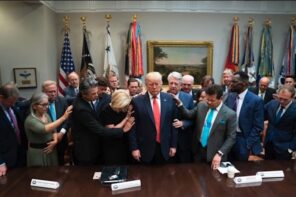On Valentine’s day, President Yoweri Museveni of Uganda announced that he will assent to the Anti-Homosexuality Bill that will demand a life-sentence for gays and criminalize advocacy. The world reacted with rage, but Uganda’s lawmakers and citizens celebrated the announcement as a “Valentine gift.”
It’s tempting to view Museveni’s move as strange, especially if one reads the letter he sent last month that pushed back against the bill passed weeks earlier by the parliament. But, we’ve seen similar moves in American politics, when moderate politicians like Mitt Romney and Senator McCain were forced to denounce LGBT persons to win evangelical votes. Museveni is doing the same. He knows that he needs Ugandans more than the West to remain his nation’s most powerful individual.
President Obama’s warning that signing the bill into law would affect Museveni’s relationship with the U.S. works to Museveni’s advantage. By signing this draconian bill, Museveni repositions himself as the defender of Uganda against “Western imperialism” on one hand, and the defender of Ugandan religious and cultural values to the populace, on the other. In fact, he has already started playing this game.
Speaking at NTV, for example, he called on all Ugandans—scientists, lawmakers and the Church—to stand with him as he fights to protect Uganda’s traditional values against the United States of America. This is a fight Museveni has been looking for. He knows that both the U.S. and the EU won’t support his attempt to run again so he will interpret the West’s opposition to his bid for another term as due to his signing of the “kill the gays bill”—winning him support from his people. He will also define his opponents as pawns of the West who are poised to legalize homosexuality—again winning him support among Ugandan voters.
But the move will also purify his image among American Conservatives like Scott Lively, Lou Engle, and Sharon Slater, among many others, who will celebrate him for standing up to what they see as Obama’s global gay agenda. Unfortunately, this law will also give cover to other African nations to pass similar bills. So it’s no longer about how many more nations will move with similar bills, but what will it take to protect the lives of LGBTQ Africans from state-sanctioned violence and persecution. This is the question that needs to be addressed.




